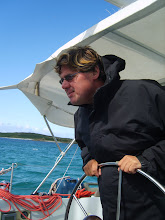So now I've been doing the many chores which I've been putting off, scraping the antifouling, drilling holes for new senders, and getting the keel sand blasted. It's been a while since Victor Too was on shore and I hope to get the prop replaced with a folding one, for I have gotten tired of the sound of the prop turning while we sail.
So now the boat is a mess once again, for all the work tools have come out of hiding and certain inaccessible spaces had to be made available to put stuff in them, such as: holes!
This is the one for the log transducer. I re-used an old log site so I didn't have to make yet another hole in the hull. I just made the existing one bigger. Making a new one would have been easier, but the hull already has so many holes a Swiss cheese would feel quite inferior to it.
Yesterday I celebrated the sale - finally - of the bike and the termination of some more contracts I was bound to, such as insurance, insurance and even more insurance. I now only have two more insurance contracts going and it feels good to get away from some of the modern entanglements.
I need to get a replacement for the autopilot motor since it packed up while we were crossing Biscay. I already got someone on it but I dread to think what it'll cost. These Raymarine parts rarely come cheap.
But last night, I went out to eat and I found a local eating place which serves good quality Portuguese cooking which set me back a total of 5,5 Euros for food and half a litre of Vinho Verde. It's hard to think of a reason why I should go to the trouble of cooking, washing up, let alone get the ingredients for this type of food at these prices. Life can be cheap and it's about time, because getting here sure cost me enough. And that Romeo y Julieta cigar I savoured yesterday, was a well earned treat after a 1000 Mile trip South.
